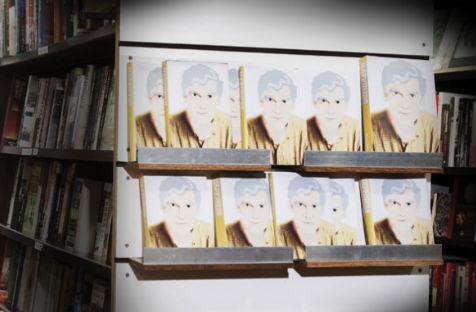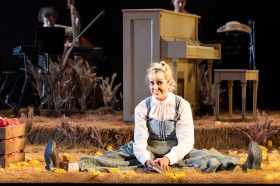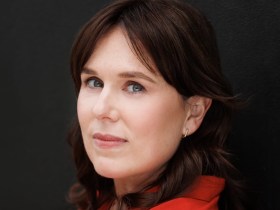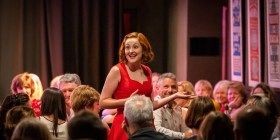Ensemble Theatre’s latest production of David Williamson’s Happiness doesn’t break new ground, but those who feel burdened by modern life will relate.
A suitable Twitter hashtag for Happiness would be, ‘#Firstworldproblems.’ A dull professor who lectures in wellbeing struggles to bring his theories on this into the home. His daughter obsesses over man problems and experiences bullying in her job as an environmental reporter for a Murdoch newspaper. His wife, unsatisfied with their lack of a harbour-view penthouse and bored with her husband spends her time drinking Chardonnay and doing charity work. None of them could be described as happy.
According to psychology professor Roland Makepeace (Mark Lee), there are five scientifically proven indicators of happiness, which include having friends and a sense of purpose. After administering a personality test to his daughter Zelda (Erica Lovell) he sets her a series of tasks, which include performing a secret good deed and writing a letter of gratitude. The bulk of the play consists of the disastrous consequences of these actions.
Meanwhile, Makepeace’s own wellbeing is tested when his wife, Hanna (Anne Tenney) meets up with an old flame, Sam (Peter Kowitz). Through a series of mishaps, timely jokes and observations on life, it becomes apparent that good cheer may be more difficult in practice than in theory. Eventually the characters arrive at an alternate acceptance of happiness in the all-too-perfectly gift-wrapped ending.
The characters in Happiness are often one-dimensional. The experienced Lee, Lovell and Tenney put in reasonable performances as the Makepeace family members. Adriano Cappelletta is seldom challenged when playing the weak Ronnie and Richard, Zelda’s love interests; nor does Kowitz need to overstretch himself as the obnoxious and overly stereotyped businessman. Far more entertaining is Glenn Hazeldine, in his short stint as Zelda’s chauvinistic, right wing boss. At times the dialogue and manner of delivery between characters stretches to being unrealistic.
Brian Nickless’ efficient use of television screens displaying icons such as Sydney Harbour and street signs cleverly establishes a strong sense of place and is one of the production’s great strengths. Wardrobe coordinator, Lisa Mimmocchi succeeds in assisting with outfits which suitably match the stereotypes of the characters.
In her interpretation of, Happiness, director Sandra Bates hasn’t pushed any boundaries. The idea itself is simple and the play will strike a chord with the sentimental or those who have pondered the issues of modern day living. In its present state, ‘Happiness’ is unlikely to endure over time, but like any wrapped-gift, it will give a certain amount of instant gratification for those seeking light entertainment.
Rating: 3 stars.
Happiness
Writer: David Williamson
Director: Sandra Bates
Designer: Brian Nickless
Lighting Designer: Peter Neufeld
Stage Manager: Danielle Morrison
Wardrobe Coordinator: Lisa Mimmocchi
Performed by: Adriano Cappelletta, Glenn Hazeldine, Peter Kowitz, Mark Lee, Erica Lovell, Anne Tenney.
Ensemble Theatre.
9 May – 6 July 2013.






